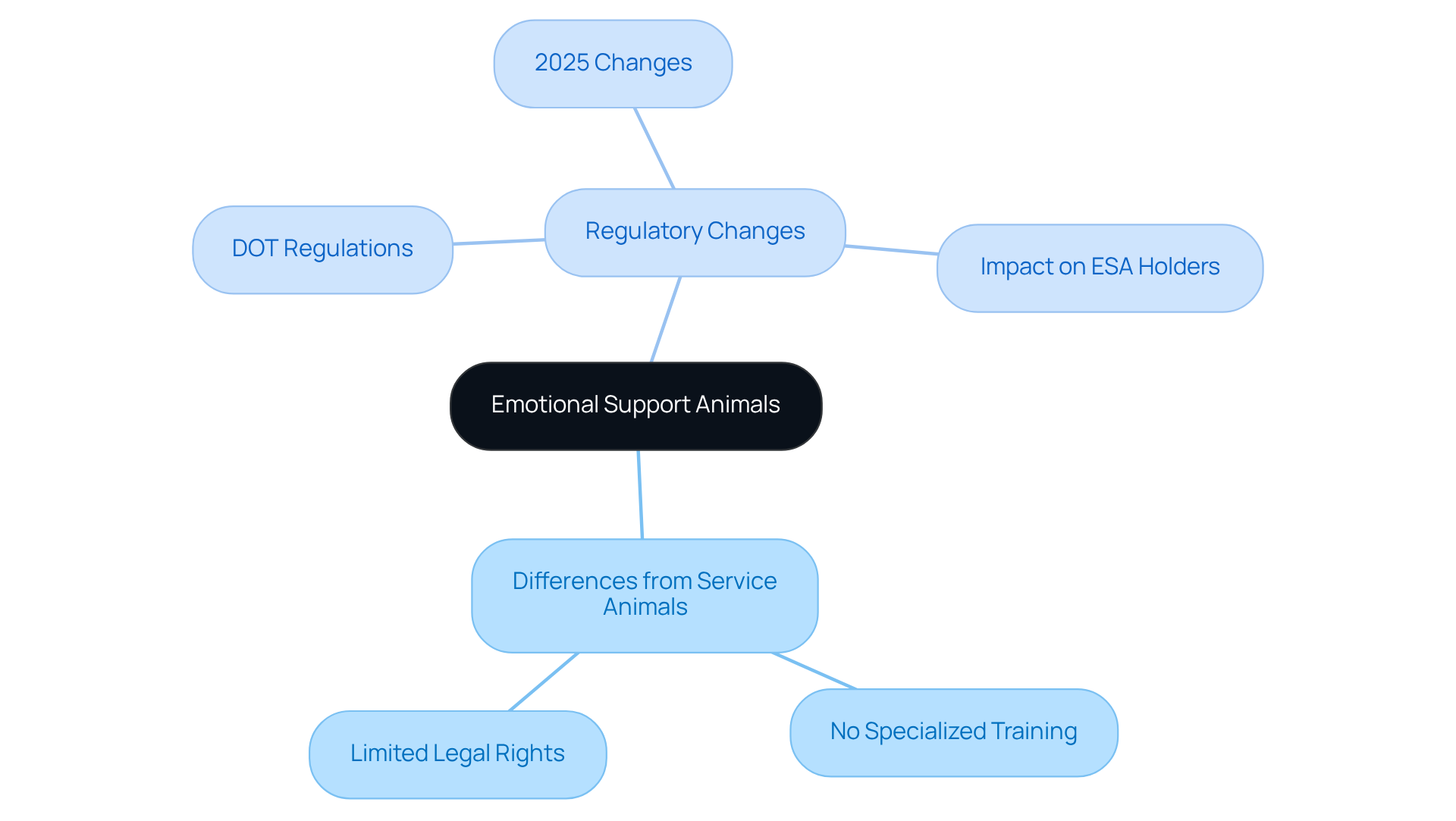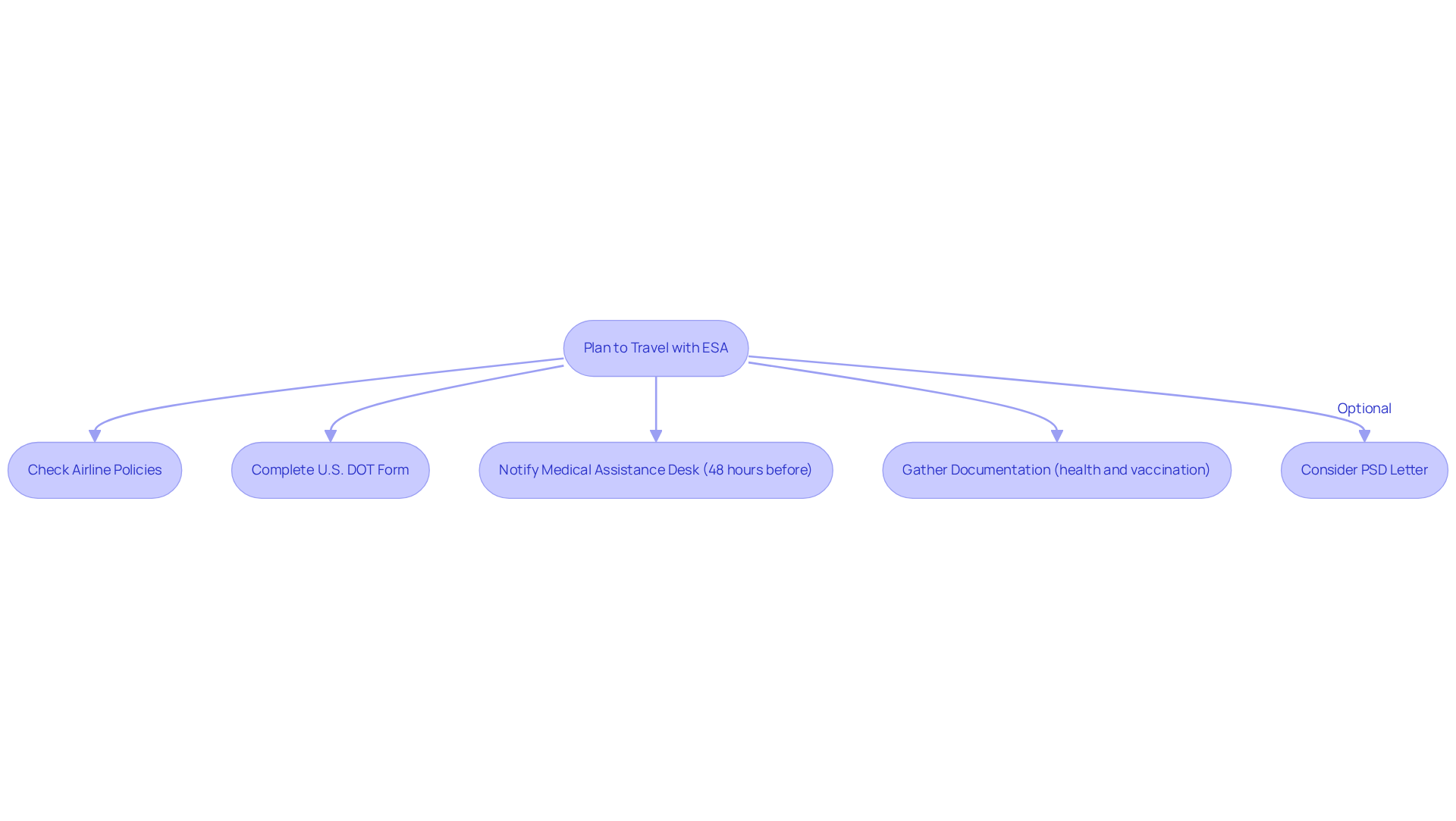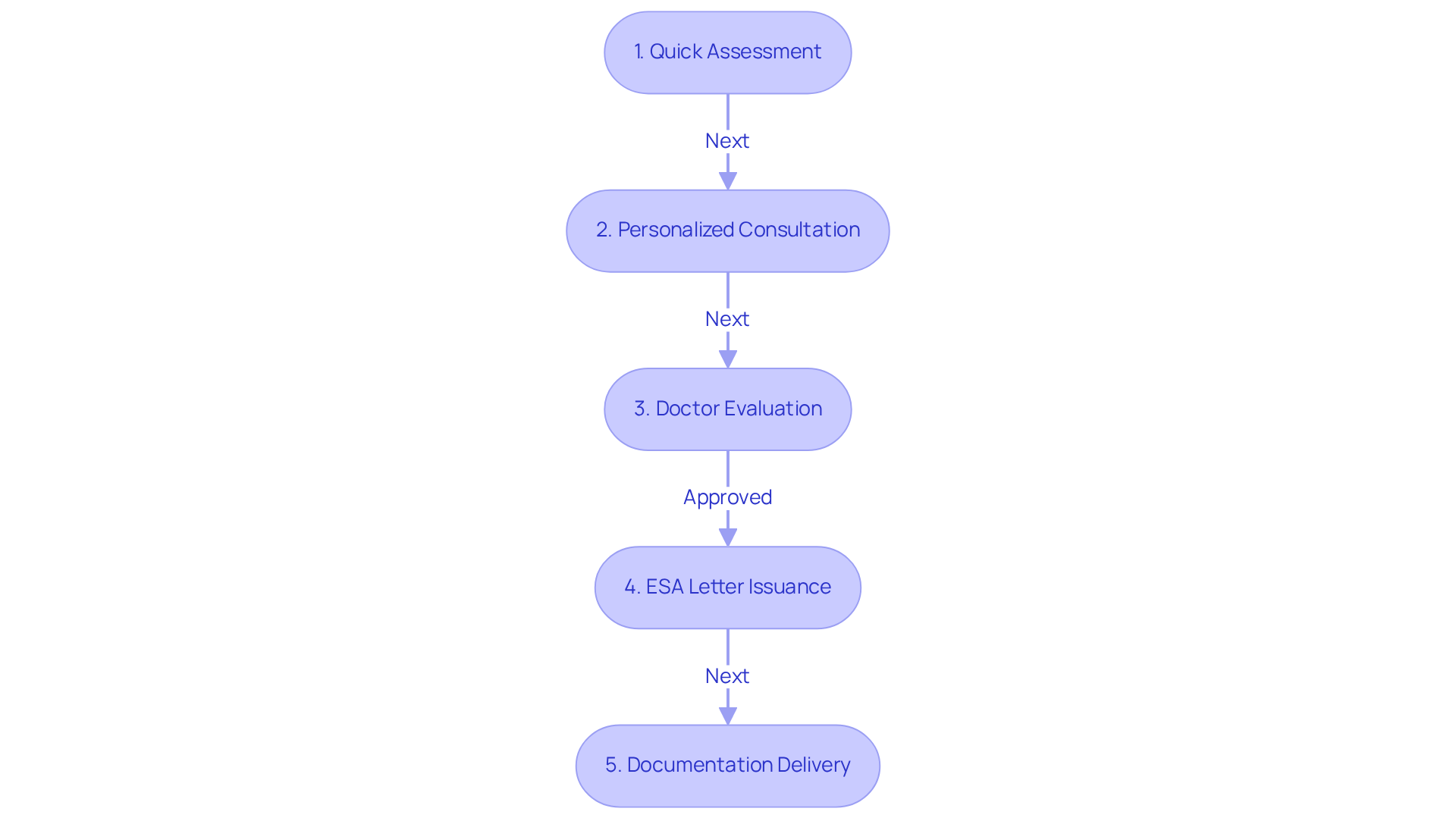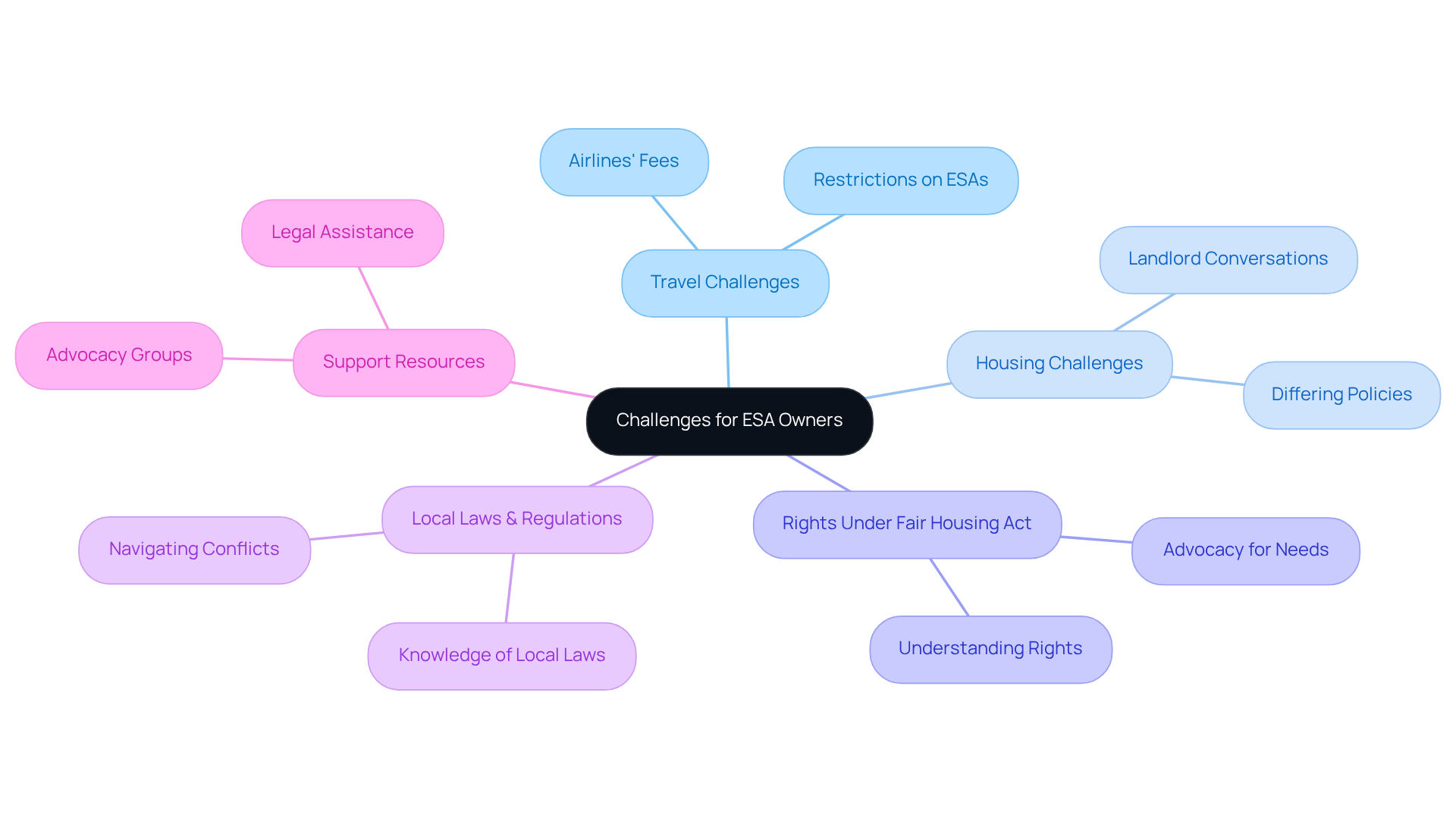

New Rules for Emotional Support Animals on Planes: What You Need to Know
by Lena Park
Last updated: July 18, 2025
Verified and Approved by:
Angela Morris,
MSW, LCSW
Fact Checked

Overview
As we approach 2025, new regulations will change the landscape for emotional support animals (ESAs), as airlines will no longer recognize them as service companions. This shift may lead to adjustments in fees and travel policies for those who rely on ESAs. It’s vital to understand these changes and prepare the necessary documentation to navigate the complexities of air travel with your beloved companion.
For many individuals facing mental health challenges, the emotional support provided by an ESA can be life-changing. However, with these new regulations, it’s natural to feel anxious about what this means for your rights and your ability to travel. The importance of advocacy regarding your rights under the Fair Housing Act cannot be overstated.
We encourage you to take proactive steps in preparing for these changes. Securing an ESA letter can be a supportive solution, offering the necessary documentation to ensure your needs are recognized. Remember, you are not alone in this journey. There are resources and support available to help you navigate these new regulations with confidence and compassion.
Introduction
Navigating the complexities of air travel can feel overwhelming, particularly for those who depend on Emotional Support Animals (ESAs) for comfort during their journeys. As we look ahead to 2025, significant regulatory changes are on the horizon; airlines will no longer be mandated to recognize ESAs as service animals. This shift poses a considerable challenge for travelers who rely on these beloved companions.
In this article, we will explore the implications of these new rules for ESA holders, offering essential information and compassionate strategies to help ensure a smooth travel experience.
How can individuals adapt to these changes while still cherishing the emotional support that their animals provide? Together, we will navigate this journey, finding ways to maintain the bond that brings comfort and solace.
Overview of Emotional Support Animals and Regulatory Changes
Emotional Support Creatures serve as comforting companions for individuals navigating emotional or psychological challenges. While support creatures are trained to perform specific tasks for those with disabilities, emotional support companions do not require specialized training and, importantly, do not share the same legal rights and access to public spaces as service dogs under the ADA.
Recent changes in regulations, particularly from the U.S. Department of Transportation (DOT), have introduced new rules for emotional support animals on planes in air travel. Beginning in 2025, airlines will follow new rules for emotional support animals on planes, which means they will no longer be required to recognize emotional support creatures as service companions. This means that these supportive entities may face different rules and fees compared to service companions.
This transition underscores the importance for ESA holders to understand their rights and responsibilities under the new rules for emotional support animals on planes, particularly in relation to the Fair Housing Act and air travel policies. It’s essential to stay informed and prepared, ensuring that you can navigate these changes with confidence and support.

Details of the New Regulations for Traveling with ESAs
Navigating the new rules for emotional support animals on planes can be challenging for those who rely on ESAs. Air Canada now treats ESAs as pets, which may bring about additional stress for ESA holders who previously depended on these animals for comfort during travel. This change means that individuals may need to pay pet fees and adhere to specific airline policies regarding pet travel, which can feel overwhelming.
For many, the bond with their ESA is a source of emotional strength, and the thought of facing travel without that support can be daunting. It’s essential for ESA guardians to understand that completing a U.S. DOT form and notifying the Medical Assistance Desk at least 48 hours before the flight can help ease the process. Additionally, having a psychiatric service dog (PSD) letter can facilitate a smoother check-in experience, providing some reassurance during what may feel like a stressful time.
Moreover, airlines can request documentation that proves the animal’s health and vaccination status, which adds another layer of complexity. It’s crucial for ESA guardians to check with their airline before traveling to fully grasp the requirements and any potential fees associated with bringing their ESA on board.
While there are no breed restrictions for service dogs, it’s important to note that snub-nosed breeds might face limitations, and pet carriers must meet size guidelines. These modifications aim to simplify the travel process; however, they may inadvertently create challenges for those who relied on previous regulations, especially in light of the new rules for emotional support animals on planes.
In this time of change, remember that support is available. Connecting with professionals who can assist in obtaining an ESA letter can be a compassionate solution to help navigate these new challenges. Your emotional well-being is important, and having the right support can make all the difference during your travels.

Obtaining an ESA Letter: Process and Requirements
Navigating mental health challenges can be incredibly difficult, and for many, the presence of an Emotional Support Animal (ESA) can provide much-needed comfort and companionship. At Wellness Wag, we understand the emotional weight that comes with seeking support, and we are here to help you through this process with compassion and care.
To obtain a legitimate ESA letter, individuals must first undergo a streamlined assessment to determine their eligibility. Our process at Wellness Wag begins with a quick assessment tailored to your unique emotional support needs. This initial step is designed to ease your worries and set the stage for the support you deserve.
Following this assessment, you will engage in a personalized consultation with a licensed medical doctor. During this time, the doctor will evaluate your mental health requirements and the vital role an ESA can play in your treatment plan. We recognize that discussing mental health can be daunting, but our professionals are here to listen and support you every step of the way.
Once approved, the doctor will issue an ESA letter that includes your name, the type of animal, and a statement confirming the necessity of the ESA. This letter is crafted with care to comply with legal requirements, ensuring that it facilitates housing and travel accommodations for you and your beloved companion, in light of the new rules for emotional support animals on planes.
At Wellness Wag, we guarantee that clients receive their documentation promptly, often within 24 hours of the consultation. We believe that timely support is crucial, and we are dedicated to making this process as smooth and reassuring as possible. Remember, you are not alone on this journey; we are here to support you and your emotional well-being.

Challenges and Considerations for ESA Owners in Travel and Housing
Individuals who possess emotional support animals (ESAs) may face a range of challenges when it comes to traveling or finding suitable housing. The introduction of new rules for emotional support animals on planes has led many airlines to impose additional fees or restrictions on ESAs, which can make travel plans more complicated and stressful. Furthermore, housing providers often have differing policies regarding emotional support animals, making it crucial for residents to understand their rights under the Fair Housing Act. It’s important for ESA holders to be prepared to provide necessary documentation and engage in conversations with landlords to advocate for their needs effectively.
Additionally, understanding local laws and regulations related to ESAs can empower owners to navigate potential conflicts and ensure they receive the accommodations they require. This knowledge not only helps in managing interactions with landlords but also alleviates some of the anxiety that can accompany these situations. Remember, you are not alone in this journey. There are supportive resources available to help you advocate for your rights and the well-being of your beloved companion.

Conclusion
Navigating the evolving landscape of emotional support animals (ESAs) is crucial for those who rely on these companions for emotional well-being. As we face the upcoming regulatory changes, particularly the U.S. Department of Transportation’s new rules set to take effect in 2025, it’s important to recognize that emotional support animals will no longer be treated as service animals in air travel. This shift brings forth a need for a clear understanding of the rights and responsibilities that ESA holders will have under the new policies.
Many individuals may feel anxious about these changes, as they can impact their emotional support systems. Understanding the distinction between emotional support animals and service dogs, along with the specific requirements for traveling with an ESA, is essential. Obtaining proper documentation, such as an ESA letter, and familiarizing oneself with airline policies will be paramount to ensuring a smooth travel experience. Moreover, knowing one’s rights under the Fair Housing Act is vital, as it can significantly influence housing situations for ESA owners.
Ultimately, this transition represents a critical moment for ESA holders to equip themselves with knowledge and resources. Engaging with professionals who can assist in the process of obtaining an ESA letter and staying informed about airline regulations and housing policies will empower individuals to advocate for their needs. As these changes unfold, the emotional support that ESAs provide remains vital. Taking proactive steps today can foster a more manageable journey ahead, ensuring that the bond between individuals and their emotional support animals continues to thrive.
Frequently Asked Questions
What are Emotional Support Animals (ESAs)?
Emotional Support Animals are comforting companions for individuals dealing with emotional or psychological challenges. Unlike service animals, they do not require specialized training and do not have the same legal rights and access to public spaces.
How do Emotional Support Animals differ from service dogs?
Emotional Support Animals provide comfort but do not perform specific tasks for individuals with disabilities, whereas service dogs are trained to assist with particular tasks and have legal access rights under the Americans with Disabilities Act (ADA).
What recent regulatory changes affect Emotional Support Animals on planes?
Starting in 2025, airlines will implement new rules that will no longer require them to recognize Emotional Support Animals as service companions, meaning ESAs may face different rules and fees compared to service animals.
What should ESA holders be aware of regarding their rights under the new regulations?
ESA holders should understand their rights and responsibilities under the new rules for Emotional Support Animals, particularly in relation to the Fair Housing Act and air travel policies, to navigate the changes effectively.
Why is it important for ESA holders to stay informed about these changes?
Staying informed is essential for ESA holders to ensure they can navigate the new regulations with confidence and support, understanding how these changes may impact their travel and housing rights.
Certify Your Emotional Support Animal Today

Why You Can Rely on Us?
At Wellness Wag, we believe your pet deserves care rooted in both science and compassion. Each article is carefully researched, written in clear language for pet owners, and then reviewed by qualified professionals to ensure the information is evidence-based, current, and practical for real-life care. Our goal is to help you feel confident in making informed decisions about your pet’s health and well-being.
Reviewed by
Angela Morris, MSW, LCSW
Angela is a licensed clinical social worker with 20 years of experience in patient advocacy and community mental health. She has assisted numerous clients with ESA evaluations and brings a deep understanding of disability accommodations, ensuring that all information is accurate, supportive, and practical.

Written by :
Lena Park
Last Updated :
July 18, 2025












